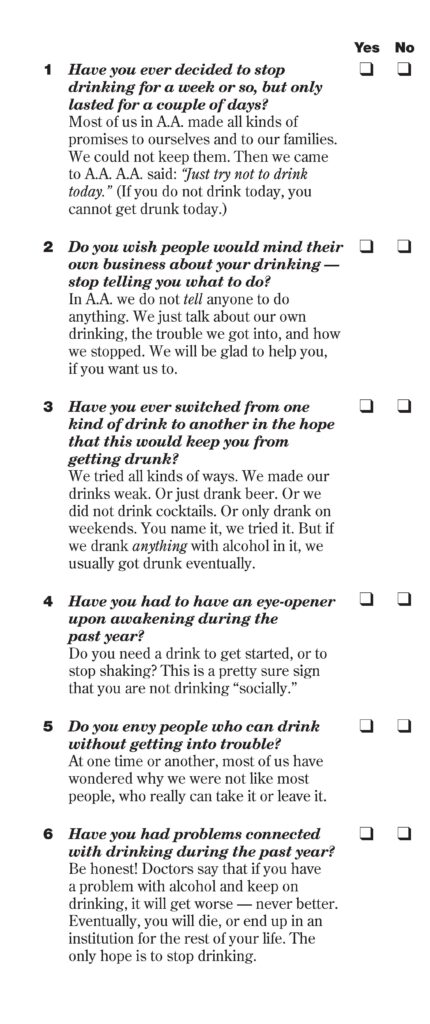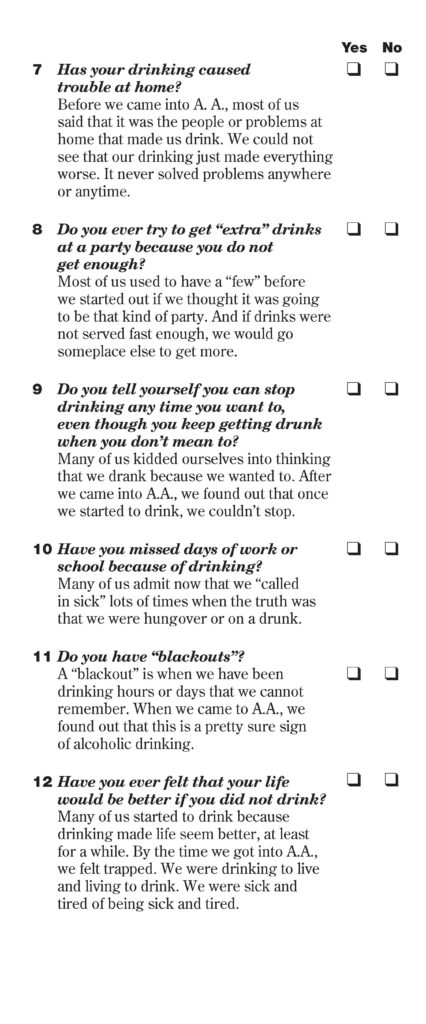There is no shame in naming your problem.
For immediate help please call our 24/7 hotline
(570) 654-0488; (800)640-7545
What Is Alcoholics Anonymous?
Alcoholics Anonymous is an international fellowship of people who have had a drinking problem. It is nonprofessional, self-supporting, multi-racial, apolitical, and available almost everywhere. There are no age or education requirements. Membership is open to anyone who wants to do something about their drinking problem.
What is the purpose of Alcoholics Anonymous?
The primary purpose of A.A. is to carry its message of recovery to the alcoholic seeking help. Almost every alcoholism treatment tries to help the alcoholic maintain sobriety. Regardless of the road we follow, we all head for the same destination, recovery of the alcoholic person. Together, we can do what none of us could accomplish alone. We can serve as a source of personal experience and be an ongoing support system for recovering alcoholics.
What happens at an Alcoholics Anonymous meeting?
- A.A. members share their experience with anyone seeking help with a drinking problem; they give person-to-person service or “sponsorship” to the alcoholic coming to A.A. from any source.
- The A.A. program, set forth in our Twelve Steps, offers the alcoholic a way to develop a satisfying life without alcohol.
- This program is discussed at A.A. group meetings:
What kind of meetings of Alcoholics Anonymous are available?
- Open meetings — open to alcoholics and nonalcoholics. (Attendance at an open A.A. meeting is the best way to learn what A.A. is, what it does, and what it does not do.)
- Closed meetings — closed to members that identify as alcoholics only.
- Speaker meetings — A.A. members “tell their stories.” They describe their experiences with alcohol, how they came to A.A., and how their lives have changed as a result of Alcoholics Anonymous.
- Discussion meetings — one member speaks briefly about his or her drinking experience, and then leads a discussion on A.A. recovery or any drinking-related problem anyone brings up. (Closed meetings are for A.A.s or anyone who may have a drinking problem.)
- Step meetings — discussion of one of the Twelve Steps.
- Beginner Meetings – Beginners’ meetings focus on the fundamental needs of early recovery that help with avoiding relapse. You can share your experience, learn about resources and literature on recovery, and get help starting the 12 Steps. For some, completing the first three steps happen in beginners’ groups.
- Big Book Study Meetings – In Big Book meetings, you will study the principles behind AA and participate in discussions about recovery based on excerpts from the book.
- Demographic Specific Meetings – Demographic-specific meetings accommodate these needs by creating safe spaces for AA members of shared demographics. Demographic-specific AA meetings include men’s and women’s AA meetings. LGBTQ AA meetings are also available for lesbian, gay, bisexual, and transgender individuals and other members of the queer community.
Is A.A. for You?
Only you can decide whether you want to give A.A. a try — whether you think it can help you.
We who are in A.A. came because we finally gave up trying to control our drinking. We still hated to admit that we could never drink safely. Then we heard from other A.A. members that we were sick. (We thought so for years!) We found out that many people suffered from the same feelings of guilt and loneliness and hopelessness that we did. We found out that we had these feelings because we had the disease of alcoholism.



For information about Alcoholics Anonymous:
- A.A. World Services, Inc.
- https://www.aa.org
- (212) 870-3400
- Box 459, Grand Central Station
New York, NY 10163
For Area Delegates:
- Eastern Pennsylvania General Service Assembly
Surrounding A.A. Areas
- Pocono Pennsylvania Intergroup
- https://poconointergroupaa.org
- (570) 424-8532
- Philadelphia and South Eastern Pennsylvania Intergroup
- https://aasepia.org
- (215) 923-7900
- Harrisburg Pennsylvania Area Intergroup
- http://www.aaharrisburg.org
- (717) 234-5390
For families and friends affected by an alcoholic:
- Pennsylvania Al-Anon/Alateen
- Al-Anon Family Group Headquarters, Inc.
- https://www.al-anon.alateen.org
- (757) 563-1600
- [email protected]
- 1600 Corporate Landing Parkway
Virginia Beach, VA 23454-5617
Grapevine News
Contact Information
- Janet L. Bryan, Director of Operations – AAGRAPEVINE, Inc.
- [email protected]
- Phone: 212-870-3406
- Fax: 212-870-3301
- www.aagrapevine.org
Grapevine Podcast